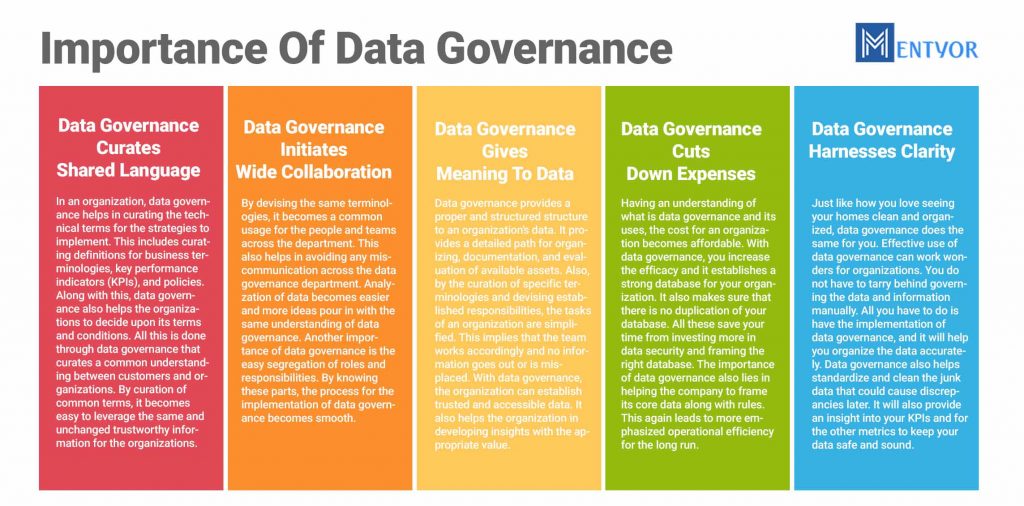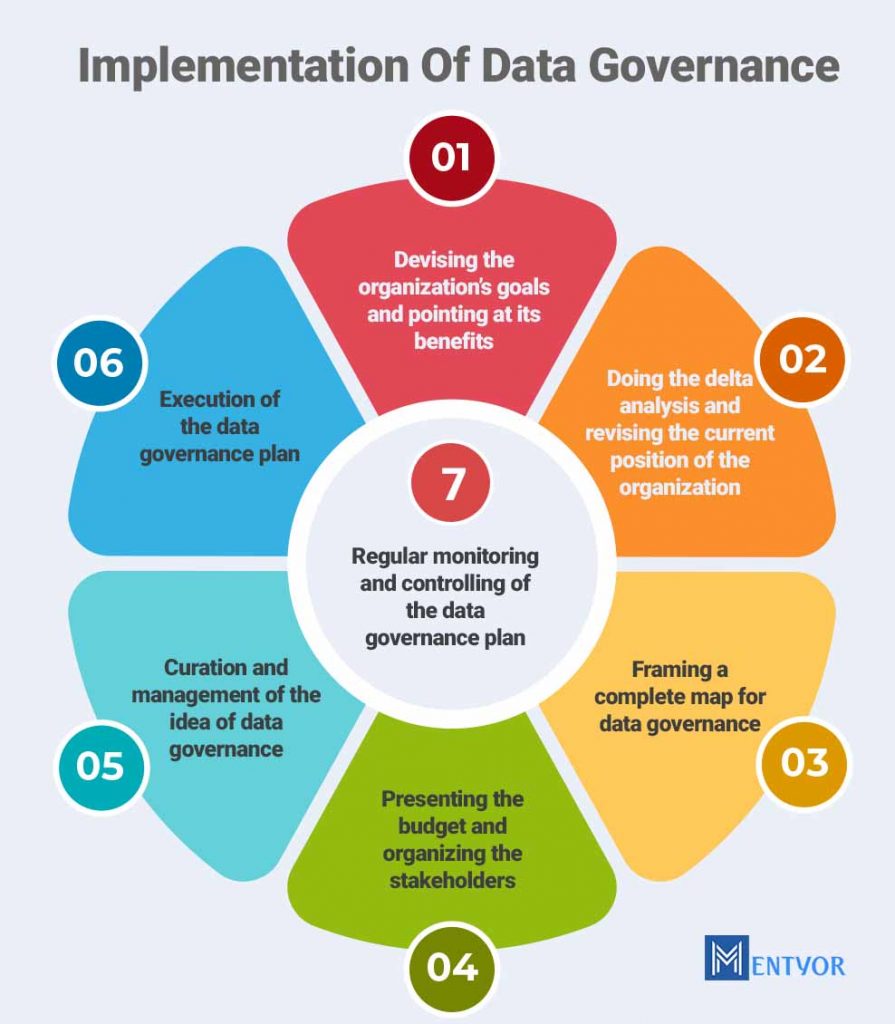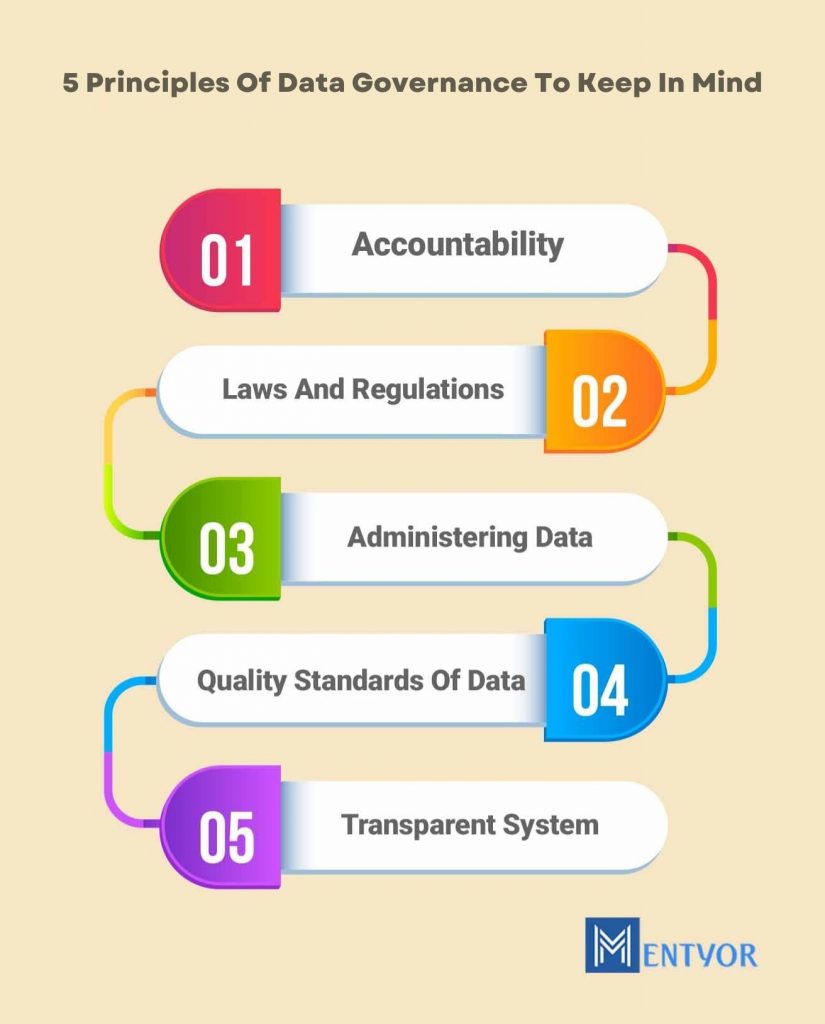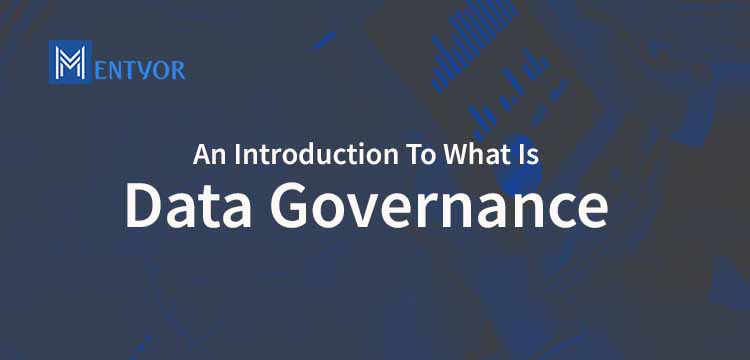In this world of changing technology, complexities to govern data never end. Everything that has to do with technology, brings in the need to maintain data. This particular reason and other factors have given rise to data governance. Understanding what is data governance is essential to ensure data rights by an organization or various institutions.
Data governance meaning holds more in detailed activities regarding data than just governing them. This concept is being rapidly underused to govern and avoid the misuse of data. It is required to avoid issues like information leakage, cyber crimes, illegal data smuggling, and many others.
You may get several data governance examples that emphasize how to operate, safeguard and govern respective data. The importance of data governance can only reach the potential with a particular team devoted to it. This is why various private and public organizations have their team which works only for data governance. But before understanding the importance and its implementation, it is required to know what is data governance. This will create the leveled ladder for us to understand data governance in the right order.
Takeaway
The changing technology world requires an understanding of what is data governance. It enables the security and quality of data. It helps organizations assemble their data and information rightly with no discrepancies.
Read our blog about Data Science and Data Analytics: Difference Between Data Science And Data Analytics: A Complete Breakdown
What Is Data Governance?
Believe it or not, data governance also holds different meanings based on its different operations. In the general sense, the answer for what is data governance is governing data to protect a large part of an organization’s security. But, what is data governance also means generating regulatory requirements [1]. This means that a particular operation/operations, time frame, and other factors are decided to operate the data. While the other side of the story, calls data governance a savior from a long-term loss. The potential implementation of data governance helps to settle small issues to avoid big losses.
The researchers and practitioners of Information Systems (IS) consider data governance very crucial. The importance of data governance lies as the right path for companies to improve and maintain the quality of data [2]. This in turn helps them to reach the strategic requirements to increase the customer base [2]. The concept of data as assets has increased the importance of data governance initially in the previous decade. According to the survey of North American organizations in 2006, the program for data governance has been one of five successful practices [3]. What is data governance has been largely distinguished from data management. It implies who holds the authority to decide what is best for the organization’s data.
Lack of implementation of data governance holds grave risks for any company or organization. Small actions left undecided towards data, can cause a ripple of problems in its management and execution [1]. This is followed by inefficiencies, ineffective practices, non-compliance to laws and regulations [1]. It also will lead to security breaches. Once the data goes to the wrong source, an entire organization stands on the brink of collapsing and threats.
As per the literature review by Newman, knowledge about data governance and data quality was more widely known in the USA, the UK than in the Asia Pacific. The problems to inculcate this in the Asia Pacific lies due to expensive costs, lack of resources, and lack of rationalization for data [4]. By this, Friedman had initiated the implementation of data governance as per ‘people, processes, and technology [4]. He also initiated that for a successful data run, the organization must keep a regular quantification for data governance.
Lastly, data governance means inculcating all that is in and around data. It refers to quality check, security, and engagement of data. It helps any organization to run a quantity and quality check for their data. In all, understanding what is data governance, gives you an insight into why it is required.
Takeaway
Data governance covers all-around data management for the organization. It decides on the quality, quantity, and security of the data. It is required for better collection and storage of data for the long term.
Know how to become Data Scientist in 2022: How To Become A Data Scientist In 2022: A Complete Guide To Data Science
Importance Of Data Governance
While you might have understood what is data governance, you must also know about its importance. Beyond the security and quality that data governance provides, it also holds relevance for various aspects. Understanding the importance will aid in the right implementation of data governance. It will ensure that everything you curate in the name of data, gives you back the targeted results.
Here are some reasons that emphasize the importance of data governance.

Data Governance Curates Shared Language
In an organization, data governance helps in curating the technical terms for the strategies to implement. This includes curating definitions for business terminologies, key performance indicators (KPIs), and policies. Along with this, data governance also helps the organizations to decide upon its terms and conditions. All this is done through data governance that curates a common understanding between customers and organizations. By curation of common terms, it becomes easy to leverage the same and unchanged trustworthy information for the organizations.
Data Governance Initiates Wide Collaboration
By devising the same terminologies, it becomes a common usage for the people and teams across the department. This also helps in avoiding any miscommunication across the data governance department. Analyzation of data becomes easier and more ideas pour in with the same understanding of data governance. Another importance of data governance is the easy segregation of roles and responsibilities. By knowing these parts, the process for the implementation of data governance becomes smooth.
Data Governance Gives Meaning To Data
Data governance provides a proper and structured structure to an organization’s data. It provides a detailed path for organizing, documentation, and evaluation of available assets. Also, by the curation of specific terminologies and devising established responsibilities, the tasks of an organization are simplified. This implies that the team works accordingly and no information goes out or is misplaced. With data governance, the organization can establish trusted and accessible data. It also helps the organization in developing insights with the appropriate value.
Data Governance Cuts Down Expenses
Having an understanding of what is data governance and its uses, the cost for an organization becomes affordable. With data governance, you increase the efficacy and it establishes a strong database for your organization. It also makes sure that there is no duplication of your database. All these save your time from investing more in data security and framing the right database. The importance of data governance also lies in helping the company to frame its core data along with rules. This again leads to more emphasized operational efficiency for the long run.
Data Governance Harnesses Clarity
Just like how you love seeing your homes clean and organized, data governance does the same for you. Effective use of data governance can work wonders for organizations. You do not have to tarry behind governing the data and information manually. All you have to do is have the implementation of data governance, and it will help you organize the data accurately. Data governance also helps standardize and clean the junk data that could cause discrepancies later. It will also provide an insight into your KPIs and for the other metrics to keep your data safe and sound.
Takeaway
The importance of data governance can be understood with these five points:
- Data Governance Curates Shared Language
- Data Governance Initiates Wide Collaboration
- Data Governance Gives Meaning To Data
- Data Governance Cuts Down Expenses
- Data Governance Harnesses Clarity
Know Top Reasons Why Data Science Jobs are in Demand: Top 9 Reasons Why Data Science Jobs Are In Demand
Implementation Of Data Governance

To begin with, data governance, understanding its implementation is very essential. This also requires you to sort out other factors before you begin with data governance. Now that we know how important data governance is for various organizations, we must also shed light on its implementation.
Below are the ideal ways for the implementation of data governance so that all goes well for your data.
Step 1: Devising the organization’s goals and pointing at its benefits
Step 2: Doing the delta analysis and revising the current position of the organization
Step 3: Framing a complete map for data governance
Step 4: Presenting the budget and organizing the stakeholders
Step 5: Curation and management of the idea of data governance
Step 6: Execution of the data governance plan
Step 7: Regular monitoring and controlling of the data governance plan
These are the easy yet mandatory steps for the organization in the implementation of data governance. The implementing and regular monitoring will further help the organization to step next in the game. Also, this will help the organization to know more about what is data governance and make changes as per requirements.
5 Principles Of Data Governance To Keep In Mind

While you are all aware of the implementation of data governance, you must know its 5 principles too. Knowing these 5 principles and keeping them in check will ensure that the data governance plan continues in the long run.
Here is a detailed understanding of the 5 principles of data governance that you must know, check and regulate.
Accountability
There must be an accountable team for an organization regarding the operation of data governance. Unless and until there are any accountable teams for the organization, the implementation of data governance will be blunt. Anyone will have the authority to operate it. This will only create a ruckus for the organization and in turn, increase the chances for data misplacement.
Laws And Regulations
There should be proper devised and uniform laws and regulations while implementing data governance. This plan should also be in line with the other external policies and laws of the organizations. The data governance council should devise these laws and regulations. Doing so will ensure that all the activities related to data usage are well and okay.
Administering Data
Having a data administrator is important for the right execution of the data governance plans. This will ensure that the data governance is in sync and no other interventions create mayhem. There will also be uniform responsibility for the organization’s data undertaking. All the activities such as data council works, laws, and regulations will be undertaken by the data administrator.
Quality Standards Of Data
Top-notch quality and reliable data must be generated by the organization to achieve success. High-quality data would ensure that there is no data amalgamation and everything in data governance is unique. It is also required to keep the information intact and maintain the privacy of the organization. A qualitative data governance plan would also be generated based on the high quality of data.
Transparent System
Within the organization, the data governance must be transparent as much as it can be. The transparency should be uniform and explain why, when, and where the data has been used. This will ensure that there is no kind of breach in the organization related to the data. Also, it will help in devising an understanding of how data should be used throughout the organization or business.
These are the 5 principles related to what is data governance. Before applying the concept of data governance for your organization, always keep these principles in check.
Takeaway
There are 5 principles to keep in head regarding the implementation of data governance. These are:
- Accountability
- Laws and Regulations
- Administering Data
- Quality Standards of Data
- Transparent System
Conclusion
With complexities in and around the technology world, data governance has gained wide recognition. Today, various organizations and other sectors are pawing their hands in data governance. Understanding what is data governance has become the initial stage to start with data governance.
In the crudest sense, data governance is the maintenance of the quality, quantity, and security of a particular organization’s data. This maintenance of the data is required so that no kind of manipulation or displacement occurs. Also, the importance of data governance lies in various aspects. The data governance meaning emphasizes the importance of clarity, collaboration, and shared understanding of data. This data governance also has some essential 10 steps for its implementation. This implementation of data governance ensures that the plan for data execution and security goes smoothly.
While you learn what is data governance, there are 5 essential principles related to it. Keeping these principles is an immense necessity to avoid the failure of applying the data governance planned. These five principles include administration of data, devising rules and regulations, accountability, quality, and transparency.
Accommodating the data governance meaning for the organization is a very careful and precise task. The team needs to sit and discuss the framework, before the implementation of data governance plans. Data governance has made it an easier task to keep all the information safe and qualitative.
Common FAQs
What are the 3 key elements of good data governance?
Good data governance must have these 3 key elements in it. These are:
- Policy framework by stakeholders for data treatment
- Action and implementation of data governance with required tools and technology.
- Assessment of policies and plans as per the objectives set
What is a data governance tool?
A data governance tool is a medium used for structuring the procedure, policies, and protocols for the data governance plans of an organization. It eases the task to set the information right, qualitatively and avoid its displacement.
References
[1] Ladley, J. (2019). Data governance: How to design, deploy, and sustain an effective data governance program. Academic Press.
[2] Otto, B. (2011). A morphology of the organization of data governance.
[3] Khatri, V., & Brown, C. V. (2010). Designing data governance. Communications of the ACM, 53(1), 148-152.
[4] Cheong, L. K., & Chang, V. (2007). The need for data governance: a case study. ACIS 2007 Proceedings, 100.


 WhatsApp
WhatsApp